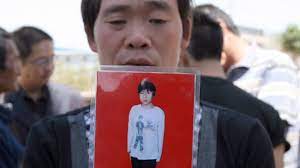Subscribe
Subscribe Now to receive Goldsea updates!
- Subscribe for updates on Goldsea: Asian American Supersite


A man suspected of murdering over a dozen boys and men and selling their flesh as ostrich meat has been arrested by police in Yunnan province in far southwestern China.
Zhang Yongming, 56, was detained two weeks ago in Nanmen village for the murder of a 19-year-old man in late April, reported the Guangxi News website. The victim’s cellphone, bank card and other belongings were found in Zhang’s home. Police also found human eyeballs preserved inside wine bottles and pieces of what appeared to be human flesh hanging up to dry, according to local media reports.
More than a dozen other teens had been reported missing from the village since Zhang’s release from prison after a 20-year sentence for murder. Zhang was known in the village as the “cannibal monster”, according to the article. He is described as a loner who never talked to neighbours. Green plastic bags containing what appeared to be white bones protruding from the top were seen hanging from his home.
Zhang is thought to have fed human flesh to his three dogs and sold other portions on the market as “ostrich meat”.
Until Zhang’s arrest the families of the missing teens had suspected they had been kidnapped and forced to work in illegal brick kilns, Xinhua said. Two local police chiefs had been sacked over their failure to solve the cases, and the central government had pushed for swift resolution of the case.
One reason is that cannibalism is a sensitive subject in China. It is known to have occurred during periods of mass starvation, including during China’s failed industrialisation drive in the late 1950s.
Acts of cannibalism used as symbolic acts against perceived enemies of the state were also reported during the Cultural Revolution from 1966 to 1976.
The sensitivity to the issue is reflected in the fact that almost all reports on the Yunnan cannibalism case were removed from Chinese websites as of Friday. Online searches for the words “missing in Yunnan” were also blocked by the nation’s censors.
